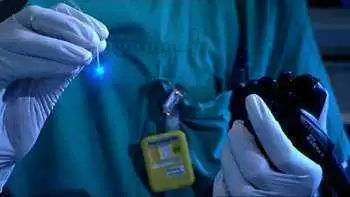Celiac.com 09/17/2009 - Just after the turn of this century, researchers at the University of Maryland School of Medicine discovered that a mysterious human protein called zonulin played a key role in celiac disease and other autoimmune disorders, such as multiple sclerosis and diabetes.
The situation might be likened to sailors who've an island, but not explored it. Researchers knew Zonulin existed, and some of its influences, but little else about it. Recently, a team of scientists led by Alessio Fasano, M.D., set out to isolate and decode zonulin. Their results are in, and Fasano's research team has successfully identified zonulin as a molecule called haptoglobin 2 precursor.
Celiac.com Sponsor (A12):
Understanding the exact biochemistry of zonulin, the exact make-up of the protein molecule, is crucial to a comprehensive study of zonulin and its relationship to numerous inflammatory disorders.
Dr. Fasano is a professor of pediatrics, medicine and physiology and director of the Mucosal Biology Research Center and the Center for Celiac Research at the University of Maryland School of Medicine.
Haptoglobin is a molecule that has been known to scientists for many years. It was identified as a marker of inflammation in the body. Haptoglobin 1 is the original form of the haptoglobin molecule, and scientists believe it evolved 800 million years ago. Haptoglobin 2 is a version found only in humans. Scientists believe the mutation occurred in India about 2 million years ago, spreading gradually among increasing numbers of people throughout the world.
Dr. Fasano's study showed that zonulin is the precursor molecule for haptoglobin 2 — that is, it is an immature molecule that develops into haptoglobin 2. Scientists previously believed that such precursor molecules played no role in the body other than to develop into the molecules they were destined to become.
But Dr. Fasano's study reveals precursor haptoglobin 2 as the first precursor molecule to serve another function altogether; that of opening a gateway in the gut, permitting gluten to pass through. People with celiac disease suffer from a sensitivity to gluten.
"While apes, monkeys and chimpanzees do not have haptoglobin 2, 80 percent of human beings have it," says Dr. Fasano. "Apes, monkeys and chimpanzees rarely develop autoimmune disorders. Human beings suffer from more than 70 different kinds of such conditions. We believe the presence of this pre-haptoglobin 2 is responsible for this difference between species."
According to Dr. Fasano, the haptoglobin 2 molecule "could be a critical missing piece of the puzzle to lead to a treatment for celiac disease, other autoimmune disorders and allergies and even cancer, all of which are related to an exaggerated production of zonulin/pre-haptoglobin 2 and to the loss of the protective barrier of cells lining the gut and other areas of the body, like the blood brain barrier."
"The only current treatment for celiac disease is cutting gluten from the diet, but we have confidence Dr. Fasano's work will someday bring further relief to these patients. Zonulin, with its functions in health and disease as outlined in Dr. Fasano's paper, could be the molecule of the century," says E. Albert Reece, M.D., Ph.D., M.B.A., dean of the School of Medicine, vice president for medical affairs of the University of Maryland and John Z. and Akiko K. Bowers Distinguished Professor.
Dr. Fasano published his findings in the online version of the Proceedings of the National Academy of Sciences, appearing the week of September 7, 2009.







Recommended Comments